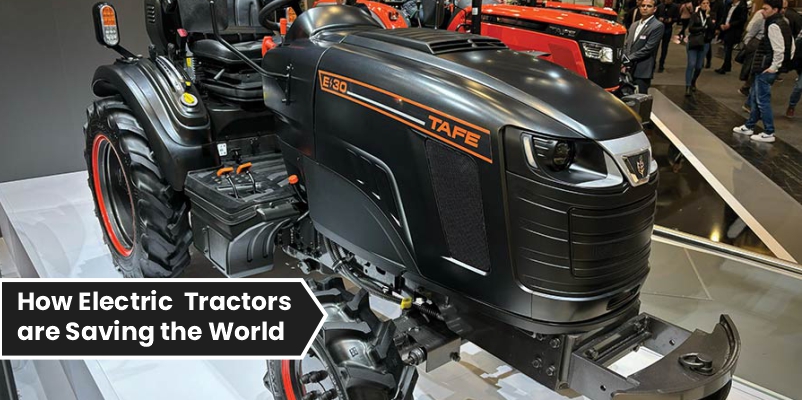Electrification offers more than just using batteries to power devices. It is about implementing electrical drives instead of engines and hydraulics. Electric motors produce a lot of torque at low speeds, and they’re more efficient, reliable, and lightweight. In this fascinating journey, we explore the impact of electric tractors on our planet Earth. These electric machines are changing the game in the agricultural industry, where they offer sustainable solutions to traditional farming practices. Let us explore the future of electric tractors and how they will impact the environment.
Electric Tractors affect on the Environment
What if diesel tractors are replaced by electric tractors There will be several changes in agriculture and the environment. First of all, there will be a drastic change in carbon emissions, which will contribute to a clean environment and control climate change. Due to less air pollution and minimizing soil contamination associated with diesel exhaust, the health of the soil will be enhanced.
The dependency on fossil fuels will be reduced, which will make farmers experience lower operational costs. Electric tractors are quieter and produce less noise pollution compared to diesel tractors, which will create a peaceful farming environment. The transition from diesel to electric tractors will be a critical step toward sustainable and environmentally friendly farming.
Future of Electric Tractors
The future of electric tractors looks promising, with several companies investing in research and development to create more efficient electric tractors and advanced features such as smart farming tools, advanced batteries, and automated/remote-controlled tractors.
Pros and Cons of Electric Tractors
Pros of Electric Tractor
1. Environmental Benefits: because of less emissions by electric tractors emit fewer emissions, it will contribute to lower carbon footprints and improve air quality, which makes electric tractors environmentally friendly.
2. Cost Saving: In the long-term period, electric tractors will reduce operational costs due to their lower maintenance and fuel expenses.
3. Less Noise Pollution: Electric tractors operate more quietly than diesel tractors, which makes electric tractors reduce noise pollution in agricultural areas.
4. Energy Efficiency: Electric motors are more energy-efficient than internal combustion engines, resulting in higher overall efficiency in transforming energy into usable work.
5. Government Incentives: Many governments provide incentives and subsidies to encourage farmers to use electric vehicles.
6. Reduced Dependence on Fossil Fuels: Electric tractors help to reduce reliance on fossil fuels, encouraging energy independence and resilience in the face of fluctuating fuel prices.
7. Technological Integration: Electric tractors easily link with precision agriculture equipment, enabling more precise and efficient farming techniques.
8. Longer Lifespan: Electric tractors typically have fewer moving components and endure less wear and tear than diesel tractors, potentially resulting in a longer operational lifespan.
Cons of Electric Tractors
1. Limited Range: When compared to diesel tractors, electric tractors may have a shorter range, which can be problematic for big farms or those that need to operate for long amounts of time between charges.
2. Charging Infrastructure: The availability of charging infrastructure in rural areas may be a barrier to the widespread adoption of electric tractors in certain places.
3. Initial Cost: The initial cost of electric tractors, including the price of batteries, maybe more than that of standard tractors.
4. Battery Technology Challenges: Current battery technology is limited in terms of energy density and charging time. Advances in battery technology are critical for enhancing electric tractor performance.
5. Limited Model Availability: The number of electric tractor models on the market may be limited when compared to traditional tractors, restricting possibilities for farmers with unique needs.
6. Uncertainty in Resale Value: The resale value of electric tractors is unpredictable because it is determined by factors such as battery condition and technological improvements.
Conclusion
In conclusion, electric tractors are like superheroes for our environment and farming. They bring cleaner air, quieter fields, and lower costs for farmers. The switch from diesel to electric tractors is a big step towards saving our planet. As we look ahead, the future seems bright with even better electric tractors on the horizon, equipped with smart tools and advanced features. While electric tractors have many advantages, like helping the environment and saving money, there are challenges too, such as limited range and initial costs. Despite these challenges, the journey towards electric tractors is a positive one, promising a greener and more sustainable farming future.


